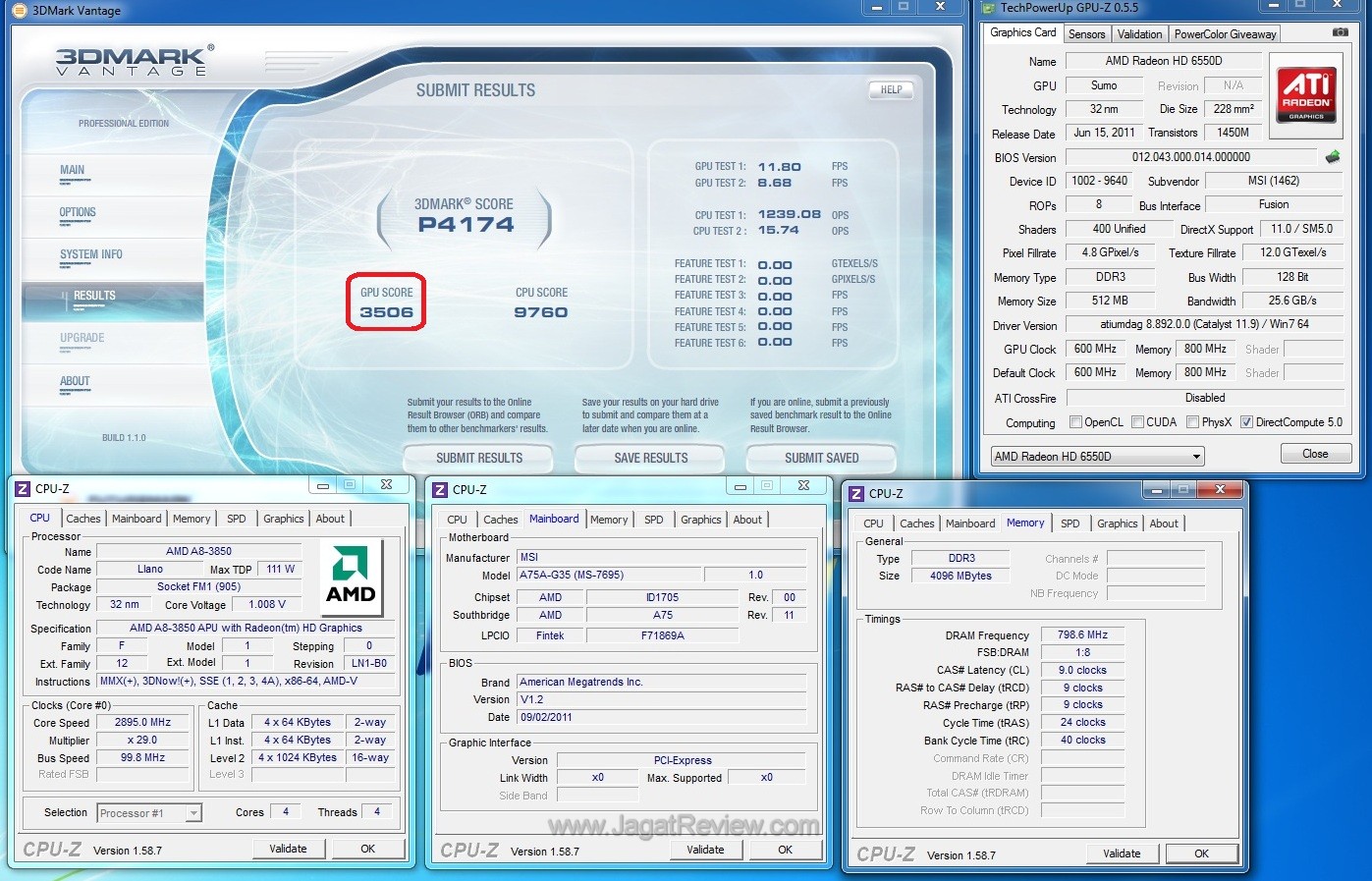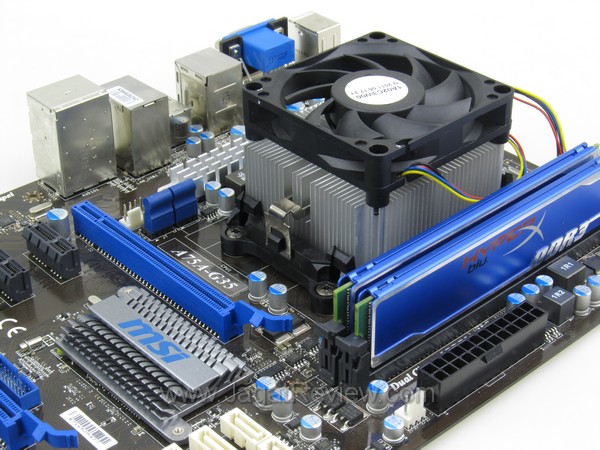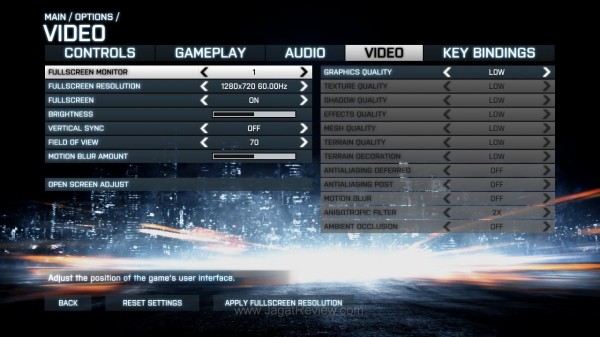The long awaited third-installment of EA’s popular Battlefield game
series has arrived. With its attractive gameplay and gorgeous visual
effects, Battlefield 3 (BF3) sure doesn’t disappoint. Frostbite 2 is the
engine, and it really delivers the kind of quality that motivates some
gamers to upgrade their PC, just to experience BF3 at it’s best.
But not everyone is able to afford a super high-end system capable of
running BF3 at its “Ultra” graphics setting. So, what if you happen to
have a budget PC equipped with an integrated graphics solution as in
AMD’s Llano series of processors? Could the on-board graphics take on
BF3’s demanding engine? Before we get to the answer, let us first
examine the game’s minimum hardware requirement.
Battlefield 3 Minimum System Requirement
As announced by EA on September 20, 2011, this is the minimum system
requirement that must be met or exceeded in order to play BF3 with
acceptable frame rates:
- OS : Windows Vista (Service Pack 2) 32-Bit
- Processor: 2 GHz Dual Core (Core 2 Duo 2.4 GHZ or Althon X2 2.7 GHz)
- Memory: 2 GB
- Hard Drive Space: 20 GB
- Graphics Card (AMD): DirectX 10.1 compatible with 512 MB RAM (ATI RADEON 3000, 4000, 5000 OR 6000 series, with ATI RADEON 3870 or higher performance)
- Graphics Card (NVIDIA): DirectX 10.0 compatible with 512 MB RAM (NVIDIA GEFORCE 8, 9, 200, 300, 400 OR 500 series with NVIDIA GEFORCE 8800 GT or higher performance)
- Sound card : DirectX compatible
- Keyboard and Mouse
- DVD ROM Drive
For us, the above list seems quite normal for today’s standard,
although we cannot tell for sure how much frame per second one could
expect from this configuration.
Some people might be discouraged upon seeing BF3’s minimum system
requirement, especially its “graphics card” section. However, a closer examination
reveals that BF3 does not demand that much processing power from your
graphics hardware. Let’s look at the official statement: “DirectX 10.1 compatible with 512 MB RAM, with ATI RADEON 3870 or higher performance“. The ATI Radeon HD3870 mentioned here tells us that the game should still be playable even on an affordable DirectX 10 graphics card.
For starters, a Radeon HD 3870 scored between 3800 to 4000 points in
3DMark Vantage (Performance Preset) benchmark, according to our old
database. Now, you can get similar performance from an integrated GPU
solution from AMD that’s certainly won’t hurt your wallet. That’s right,
AMD’s Llano is the answer!
With its integrated Radeon graphics core, AMD A-Series APU (Llano) has no trouble keeping up with dedicated graphics cards like the ATI Radeon HD 3870. We were able to score 3500 points without overclocking the on-board GPU, as seen in the picture below:

So, now we know that Llano is not so far behind the HD3870 mentioned
as the minimum graphics card required for BF3. It’s time to find out if
it really has what it takes to run the game!
Our Setup of Choice: AMD A8-3850, MSI A75A-G35, Kingston HyperX DDR3-1600

We had one goal in mind when selecting the hardware components for
this test: constructing a system capable of running Battlefield 3 that
still feels easy on the wallet. The processor is AMD A8-3850 on MSI A75A-G35 motherboard, coupled with Kingston HyperX DDR3-1600 4GB memory module. That ought to do it.
The AMD Llano A8-3850 processor (or APU, to be exact) was chosen
because it has four CPU cores and an integrated GPU that could come
close to Radeon HD 3870 in terms of graphics processing prowess.
Kingston’s HyperX KHX1600C9D3B1K2/4GX (DDR3-1600, 4GB kit) was chosen
because it offers good performance
and capacity while still being affordable to most people. The memory
was set to run at its specified rating of DDR3-1600 (therefore not
following the default setting of 1333 MHz or overclocked to 1866 MHz).
#Notice : An SSD was used (instead of conventional hard drive) as
the main storage unit to avoid sudden drops of frame rate in the game
due to hard drive accessing activities during the game. It is important
to make sure that the minimum FPS we obtained was purely from the works
of the GPU, and not incidental storage accesses.
Battlefield 3 Graphics Setting: LOW Preset, 1280×720
Battlefield 3 was then installed and we ran a preliminary test using
various graphics detail settings to find out the right one that provides
a reasonable frame rate for playing.
We found BF3 to be quite playable on our budget-oriented system at 1280×720, LOW preset. Click on below picture to enlarge.

Surprisingly enough, even at its lower detail setting, the visuals in
this game are still appealing to the eyes… well, to ours at least. Save
for all the jaggies that seem to be appearing just about everywhere.

Additionally, here is BF3’s resource utilization as monitored by Task Manager and AMD System Monitor.

As shown by the above picture, we can see that BF3 puts quite a burden
on the CPU, loading it by 66% spread evenly on all cores. This leads us
into questioning the game’s dual-core CPU minimum requirement. With this
kind of load, dual-core systems would possibly have to deal with
near-maximum utilization (very close to 100% even). It also shows that,
with its four cores, A8-3850 is a sensible choice for BF3.
Memory utilization is quite low, at “only” 1.89 GB (our system uses up around 700 MB when idle in desktop). It means that the 2 GB minimum requirement is sufficient. Only, we see no reason for holding back since 4 GB kit modules have become very inexpensive as of late.
Okay, now we’re going to see the actual numbers with FRAPS while playing the “Operation Swordbreaker” level that you will encounter at the beginning of the game. We separated the test into three different parts based on pre-loaded checkpoints. Here are the results:
Memory utilization is quite low, at “only” 1.89 GB (our system uses up around 700 MB when idle in desktop). It means that the 2 GB minimum requirement is sufficient. Only, we see no reason for holding back since 4 GB kit modules have become very inexpensive as of late.
Okay, now we’re going to see the actual numbers with FRAPS while playing the “Operation Swordbreaker” level that you will encounter at the beginning of the game. We separated the test into three different parts based on pre-loaded checkpoints. Here are the results:

In this second checkpoint we will see how Llano
performs in an intense gunfight scene, with loads of explosions and RPG
rockets. This particular scene is demanding when it comes to graphics
processing requirement, and the frame rate plummeted to well below 30
FPS for quite some time, around half a minute. Total average FPS for our
first run is 35.4.
Run 2 (Operation Swordbreaker, Checkpoint 3)

This checkpoint pits the player against a sniper in camouflage. At
first, the scene is fairly “lightweight”, graphics wise. Then, an
exploding building sent the frame rate down in an instant. The second
run lasts for a while because the player is involved in another gunfight
to save a partner. The fight continues down a dark tunnel. Average FPS
in the second run is a bit higher compared to the previous one, at 38.4 with a minimum rateof 27 FPS.
Run 3 (Operation Swordbreaker, Final Checkpoint)

Now we’ve arrived at our last gunfight. This time, the big guns are
brought to the scene. The third run was relatively shorter than the
previous two, and the FPS was also good. Our AMD A8-3850 was able to
maintain a frame rate of well above 30 FPS most of the time, except for
one particular moment when we recorded a drop to 27 FPS. In all, the
third run scored an average frame rate of 37.4 FPS.
(Temporary) Conclusions
It was quite a surprising find indeed. Llano’s integrated GPU tuned out to be just powerful enough to provide an average of 35
FPS in the early levels of Battlefield 3. Well, this might not be a
reference that’s applicable to all cases since we only ran the test
through the early levels of the campaign. It is because, frankly, we
haven’t been able to explore the entire game to find out exactly which
level is most demanding in terms of graphics processing requirement. (but we will ! ^_^ )
In BF3, the integrated Radeon GPU in AMD Llano once again proves itself to be the most powerful on-CPU graphics core, at least by the time of writing of this article. The frame rate occasionally drops to below 30 FPS, but most of the time, Llano managed to yield more than that. It’s worth noting that the scores from our system do not necessarily represent Llano’s true potential. For example, we weren’t running the memory modules at 1866 MHz. Also, the integrated GPU itself was not overclocked. Presumably, there is still some headroom left for tweaking. It’s possible to fork out, say, 20% more performance from Llano, but let’s save that for another time, shall we? Stay Tuned for more updates, only at youruniquerig.blogspot.com!
In BF3, the integrated Radeon GPU in AMD Llano once again proves itself to be the most powerful on-CPU graphics core, at least by the time of writing of this article. The frame rate occasionally drops to below 30 FPS, but most of the time, Llano managed to yield more than that. It’s worth noting that the scores from our system do not necessarily represent Llano’s true potential. For example, we weren’t running the memory modules at 1866 MHz. Also, the integrated GPU itself was not overclocked. Presumably, there is still some headroom left for tweaking. It’s possible to fork out, say, 20% more performance from Llano, but let’s save that for another time, shall we? Stay Tuned for more updates, only at youruniquerig.blogspot.com!
No comments:
Post a Comment